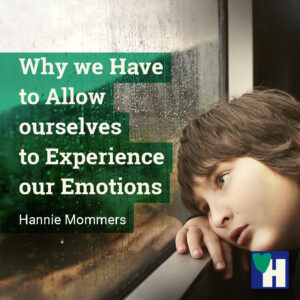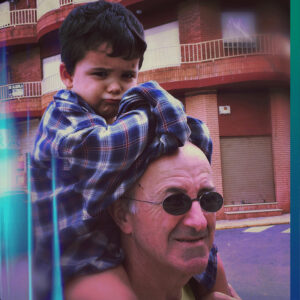
As a child, adults often tell us not to cry, to not experience our emotions, to ignore our sadness. Culturally speaking, we are taught to avoid all unpleasant emotions. At any cost.
It’s sort of funny how we teach our children not to cry and later in life are surprised we raised unhappy teenagers and adults.
In fact, it’s quite simple: when there is no dark, we have no idea what light is. When there is no black, we haven’t got a clue about white.
Often our impulse, when we experience strong emotions, is to escape them. We might do this by drinking too much alcohol, taking drugs, staying busy, emotional eating (or restricting food), smoking, and a number of other behaviours that harm us.
Yet, it is beneficial to experience our emotions.
Some of the links are affiliate links. As an affiliate associate, we earn a commission when you purchase any of the products offered through the shared links at no extra cost for you. This helps us maintain this website.
Table of contents
Experience our emotions
Instead of suppressing our negative emotions, we are better off experiencing them. Talk about this with good friends. Dig for the underlying reasons. Feel them and locate them in your body.
Life can get in the way

When I was younger I had a couple of periods of severe depression. I endured the first one in the hope it would blow over. Which eventually happened. Only to come back more fiercely after a couple of years.
I was raised by loving but strict parents. Their intention was: don’t be childish and if you don’t talk about it, it doesn’t exist. Emotional problems are for sissies.
I am glad I stepped over that part of my upbringing and sought professional help. Vulnerability is a sign of strength, not weakness.
Pain hurts
Negative emotions often feel stronger than others. When we are dealing with heartbreak it feels as though the world is ending. No pain has ever felt so concentrated, so deep or so agonizing.
The thing is, our body feels the pain of heartbreak and sadness quite literally. According to the University of California, Los Angeles’ Matthew Lieberman, the same area of our brain lights up when we experience social rejection and physical hurt. So, heartbreak literally hurts.
Negative emotions like sadness can also cause us to gain weight or lose it because we either binge on food or spurn it. Of course, this is complicated by the fact that sadness often bathes our brains in stress hormones. This causes our body to tense up, the point is to spur us into action. Except, we’re not facing a fight or flight situation, we’re just dealing with headaches, a stiff neck, and swollen muscles.
This is why it’s so important that we allow ourselves to truly experience and process the emotions that we are actually feeling.
Related: How Do We Stay Open-Minded? 5 Tips and 6 Benefits
It’s dangerous to numb pain
If we try to numb our pain and sadness, we also run the risk of numbing our joy and happiness. We can’t really pick and choose which emotions to numb, so when we try to numb one, we succeed in numbing them all.
Sure, we may experience less anger, but what of joy and happiness? Part of the experience of being human is that we have a range of emotions. Sadness and pain are just part of the human condition, and they make it possible to also experience happiness and joy. Not one emotion lasts forever, but they are all very necessary.
Struggle leads to suffering

If we fight our emotions, then we will experience more suffering. Simply because we tend to indulge in negative behaviours in a bid to numb those emotions. It’s a lot like applying butterfly stitches to a broken leg. These behaviours won’t repair any underlying issues. We will feel worse in the long run because we are teaching ourselves to rely on negative coping strategies.
Instead of suppressing our feelings, we have to become mindful observers. Take notice of the emotions that we are experiencing and allow ourselves to experience them. What is it they try to tell us? For example, resentment may be indicative of someone who is disrespecting our boundaries.
Pain is part of a full life
Emotions are just part of life. If we focus on suppressing or numbing our emotions, then we stand in the way of our own happiness. If we want to live a life that is meaningful and full, then we have to process our emotions.
Every emotion that we experience is normal, healthy, and natural. The unhealthy aspect of our emotion is how we deal with it or don’t. Learning how to process our emotions is an act of self-compassion. We deserve the same kindness that we extend to our nearest and dearest. So it’s better to not beat ourselves up for the emotions that we feel. Instead, we need to show ourselves kindness and work through them.
Be vulnerable

We all get disappointments in life. Sometimes that leads to not wanting to trust anybody at all and closing ourselves. The risk of this behaviour is that life is very grey.
Vulnerability is a sign of strength, not weakness. How we heal and the way we travel through our emotions is how we free ourselves. There are a number of ways we can do this, it’s up to us to determine which method is the most effective for us, whether it is by keeping a journal, expressing ourselves through art or visiting a therapist.
Related: Why Should we be Grateful for Health and Relations? 9 Benefits
Dealing with our emotions
There are a couple of ways we can help ourselves in better dealing with our emotions:
- Talk with a good friend;
- Write in a journal what’s troubling you;
- Meditate. Try an app for guided meditations like Calm or Insight Timer if you find it difficult to start;
- Find a good therapist. I was lucky enough to find a therapist who performed Craniosacral therapy that helped me a lot;
- Osteopathy can be very helpful.
Are you aware of your emotions? Tell us in the comment box below.




I am excellent in numbing emotions or avoiding them with being busy and stuffing myself with food…
But I am also very good in reflection on my emotions and just sit with them. It depends on the stage of awareness I am in.
I still start with numbing, it’s my automated response to strong emotions (my upbringing taught me this approach very well). But I get better at allowing my feelings, regulating my own mood without suppressing or avoiding pain and sadness.
Journaling helps me, so does talking with a friend, singing along with some of my favorite songs and meditation. Or coloring a mandala, but that doesn’t sound cool and grown up at all, so let’s keep that a secret 😉
That sounds great, Kadanza. “Goed bezig” 🙂
As far as I know, colouring, whether it is mandalas or colour plates, is hip again, so it’s very cool nowadays! Moreover, why would you care to be cool or not 😉 As long as there are loads of people who like and love you, as I know is the case for you, you’re good.
Such a pity, isn’t it, that our upbringing has such a lot of influence in later life as well. It wouldn’t matter if it was solely positive, yet the negative aspects always have a stronger impact. On the other hand, I am convinced that most parents do what they do with the sincere conviction that they have the best in mind for their children.
Thanks for your comment and take care of yourself xxx
I know this so well too, Hannie!
My parents suppressed all the “bad” emotions, and I was an artistic, free, sensible, and open expressing child. Within years I became a rebel and was fighting against my parents. I understand that they have suffered from world war II as children and couldn’t live their emotions.
As adults, they stayed needy children and suppressed everything they perceived as a threat. I ended up being my mother’s emotional mother, and still, she can’t stop coming with herself and listening to me. She has never learned it.
I have never had parents who really understood and supported me emotionally but rejected me for being myself. They were not interested in my life, only to judge my person, my life negatively.
Now, my mother supports her grandchildren and asks my brothers to show more emotional support to their children, something my brothers have not learned in their childhood.
And like a daughter coming to her mother, she comes to me to receive praise and worship for her actions.
But I am the one she has stepped on all my life, creating a black sheep of me in the family, so I am the last one who can give her praise. I have learned to cope with her inferiority, and I love her, but it still hurts me very much. I am praying and meditating, trying to live a healthy life, setting up boundaries, and learning to say “No” to manipulating and controlling people. It saved my life! Excellent article, Hannie! You pressed a button in me! 🙂
I am really sorry for you to have had a rough childhood and suffered for being the black sheep. I am not sure why I have dealt with being the black sheep of the family in a different way, yet I always felt proud to be one. Might it help you to change your perspective on things that way?
Maybe it’s a good thing that your mother at least knows now that supporting is better than ignoring? Hard as it is, it would be better for you if you are able to forgive her and be kind to both yourself and her. You don’t have to praise her and ignore your own feelings. Yet being able to regard things with kindness is so much better for your own peace of mind. At least, it works that way for me. 🙂
Thanks for responding so extensively, Sylvia, and take care of yourself.
My mother was afraid of emotions. Her father had the opinion that giving in to emotions could easely destroy the thin layer of civilization that protected us from being animals. In her later days when we had very deep talkings it was possible to argue that on the aspect of emotional live we as children had a poor beginning and that we all had the project of developing a mindfull emotional life.
It’s marvellous, Jos, you were able to break the chain at the end of her life. Your grandfather probably learned that attitude from his parents and back and back. And if you hadn’t been able to go through that custom, it would go on and on. It’s a pity you don’t have children of your own because they would have benefitted from your effort. Well, I guess you will pass it on to your nieces and nephews. 🙂
Thanks for your reply and take care of yourself.
Hi Hannie, Thank you so much for your reply! I thank you so much for your beautiful response! I have forgiven her; otherwise, I couldn’t cope with the pain. And I love her because I see her as the anxious child she has been in the war. It must have been challenging to observe all the horror. I understand her very much!
That’s so good of you, Sylvia, well done. Exactly, observing the horror, and I am sure at times they had to get involved as well if they wanted to survive. My father was in an Arbeitslager in the war and he never wanted to bother us with it. Only told a few stories that were funny, as if it had been a holiday camp. But he grew quieter and quieter and in the last years of his life hardly said anything anymore, just growled at everyone. I guess he internalized everything. Such a pity.
Oh, Hannie, I am so sorry to hear this! War is horrible! I know that my father was in Berlin as a child, and has experienced horrible raping of women. They never talked about this, not my grandfathers, and not my father. Time is so different nowadays.
I can only agree, Sylvia. War sure is horrible. It would be so nice if people really got civilized and stopped fighting each other.
xxx
Hi Hannie, so true, a burden becomes so much lighter when it is shared, with a trusted friend. It is hard to find a true honest friend. If you have one appreciate it and treat the bond with respect.
Exposing your vulnerability creates intimacy.
Wonderful topic in giving guidance how to understand our emotions. I think all cultures have the same problem, I am so glad it is recognised and everybody is moving forward.
Thank you for the balance you give.
Regards
Estelle
True, Estelle, in essence, people all over the world are the same. They all have the same feelings, expectations, and vulnerabilities. We don’t deal with our emotions the same way, I guess. Culture has a big influence on our behaviour. Which can be good but also have a devastating effect on our well-being, depending on what the dictates of that culture are.
For instance, in the Netherlands, most people who lost a loved one and are at the funeral won’t express a lot of feelings. Sure, they will cry, but if possible they will do that hidden or muffled. The ones that came from a different country are much louder and more expressive in their mourning. I think the second behaviour is better but am afraid that I too am too Dutch and would suppress tears as well. Such a pity, don’t you think?
Hi Hannie,
As they say if you don’t experience moments of dark you will not recognise the light!
Is it possible that growing up amongst people with a tendency of negativity and being depressed can have an influence and a copping effect on the outcome of your emotional state? And can the opposite be true too?
Can I ask a question, and would like people to educate me please.
I grew up with no example of depression. It was not heard of in my family or extended family, or community.
I find it hard to understand, is it not possible to be able to work through it and come to a positive conclusion, with the help of a therapist? What holds one back?
What is depression really? Feelings staying in your mind and remind yourself time and time again, therefore having a negative frame of mind influencing on your life?
Can it be self pity? I know it sounds harsh, but I don’t understand it? If it is hormonal, medication will help
I apologise for my insensitive comment but I really would want to understand depression. Please forgive me.
Regards
Hi Estelle, don’t worry, I don’t think your comment is insensitive. I am not sure whether growing up in a depressing environment will cause depression. Emotions can be muffled in a depressing environment, I guess.
For me, depression is not valuing myself and not wanting to come out of bed. I had a couple of such periods but I am happy to say, that was a long time ago. Yes, therapy helps. I don’t know about medication because I never had any. A colleague of mine did and it helped him a lot.
If I say I am still too Dutch, I mean that I don’t shout and jump up and down and be really loud when expressing my emotions. But I do express them, so don’t worry about me. 🙂